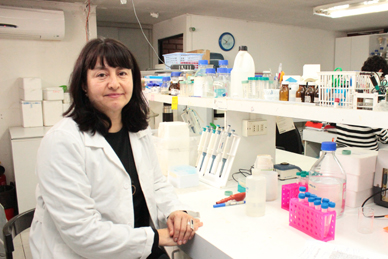- The project, funded by CORFO, is led by Dr. Claudia Ortiz, researcher at the Faculty of Chemistry and Biology, and it focuses on developing a biological filter using brown algae, enhancing copper and arsenic recovery from the water used in the mining process. The filters can also be used as desalination agents. This involves the real possibility of using seawater as an alternative to mining production processes.
Water consumption in Chile’s mining industry is now a multi-faceted problem. Water shortage in large deposits of minerals located in the center and northern part of the country, the disadvantages of the systems available for water treatment, and the figures, show that 95 percent of the recourse that enters the plants ends up as waste.
Given this reality, the project led by Dr. Claudia Ortiz, researcher at the Faculty of Chemistry and Biology, aims to obtain a biofilter prototype (biological filters) based on Chilean brown algae, which are chemically modified for the absorption of large concentrations of elements such as copper and arsenic.
In words of the researcher, "the direct recovery of copper, by using biofilters, will cause productive benefit and also an increase in the life cycle of the water process, resulting in more efficient resource usage. Also, the content of elements, such as arsenic and copper, will decrease. Their presence in the environment is a global problem because of the persistence, bioaccumulation and toxicity to living organisms. "
This project corresponds to one of the six initiatives of the Applied R & D project funded by CORFO, which the University will run.
Because of its high efficiency at low concentrations of heavy metals and its low cost, the filters may also be used as desalination agents and this means the real possibility of using seawater, as an alternative to mining production processes.
"The project involves a comprehensive solution, which is efficient and cheap to industry. Currently, this field faces three problems: access to water resources, optimization of copper production, by recovering this metal from the waste, and the use of sea water in the process," Dr. Ortiz says. She adds that in a first phase, the project includes the development of laboratory-scale biofilter prototype and then the project scaling to industrial level.
The project is conducted by: the Department of Biology of the Faculty of Chemistry and Biology; the Department of Geographic Engineering of the Faculty of Engineering, and the Department of Mechanical Engineering, as hydro-specialized support, as well as Good Harbour Technologies a Canadian company specialized in process scaling, and División Codelco Chuquicamata, as associated with the project.



